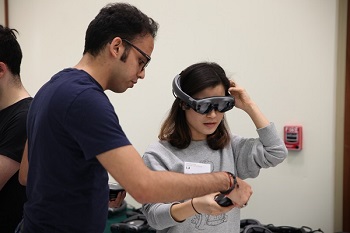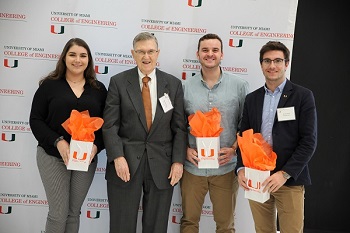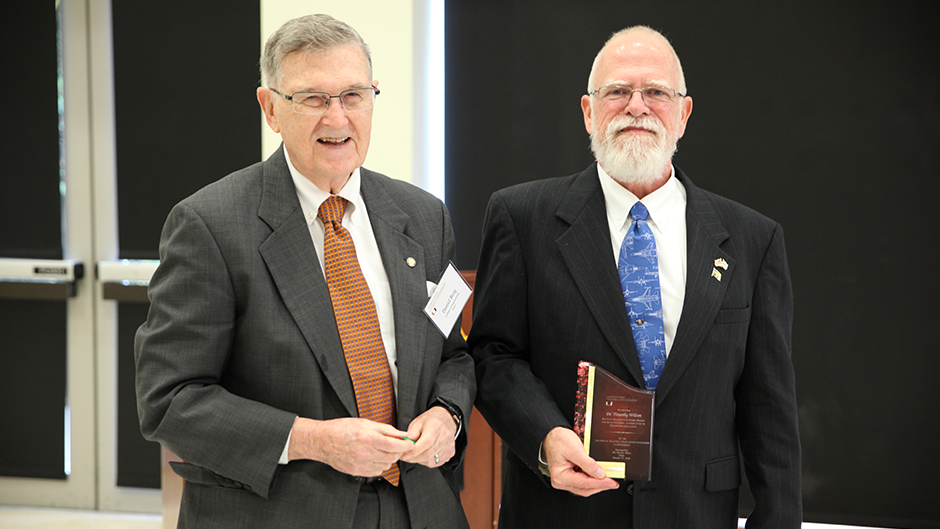On January 31, 2020, the University of Miami College of Engineering (CoE) put the spotlight on teaching and learning by hosting the second annual Teaching and Learning Innovation in STEAM (science, technology, engineering, arts and mathematics) day – also known as TALIS day – at the Newman Alumni Center.
It was a thought provoking day filled with presentations, panel discussions, a fireside chat and networking among faculty, students, staff and administrators. The day started with a warm welcome from Daniel Berg, the dean of the CoE, which led into the introduction of our keynote speaker Timothy Wilson by Derin Ural, associate dean of student affairs of the CoE.
Wilson is the chair and professor of the Electrical Engineering Department at Embry Riddle Aeronautical University. He is also the southeast region president for the American Society for Engineering Education. His passion for engineering education was evident as he delivered a captivating presentation on agile learning environments. Embry Riddle Aeronautical University was the recipient of a $2 million grant from the National Science Foundation of which Wilson is the principal investigator to research how faculty can use the agile decision-making process to better meet the needs of the students.
During his presentation, Wilson went into great detail describing the components of an agile learning environment specifically a method called Scrum. The Scrum Method makes it possible for educators to more rapidly develop effective new curriculum, teaching methods and policies in response to students’ needs, Wilson explained. The Scrum approach allows teams to work smarter and faster by assembling individuals, who have previously worked well as a team, to rapidly produce better solutions, he said.
After the keynote address, five faculty members and one teaching assistant delivered exciting presentations on the innovative teaching methods being used in their courses. The exemplary group of faculty of presenters included Ines Basalo, assistant professor of practice in the Mechanical and Aerospace Engineering Department; Lokesh Ramamoorthi, lecturer in the Electrical and Computer Engineering Department; Christopher Hartnett, senior learning and facilitation specialist in the Office of the Vice Provost for Institutional Culture; Ramon Montero, assistant professor of practice in the Biomedical Engineering Department; Lamis Amer, teaching assistant in the Industrial Engineering Department and Hammam Alsafrjalani, assistant professor in practice in the Electrical and Computer Engineering Department.
 The presentations covered a wide range of innovative teaching methods including service learning, flipped learning, collaborative learning, gamification and augmented reality. Each presenter shared their chosen teaching method and described how it was used to motivate students, get them more engaged and be more active participants in the learning process. The presentations were well received as evidenced by the insightful questions and comments from the audience.
The presentations covered a wide range of innovative teaching methods including service learning, flipped learning, collaborative learning, gamification and augmented reality. Each presenter shared their chosen teaching method and described how it was used to motivate students, get them more engaged and be more active participants in the learning process. The presentations were well received as evidenced by the insightful questions and comments from the audience.
The audience was also given the chance to vote on the most effective teaching method, and the top three winners were Alsafrjalani for his presentation on “Co-STARS Community of Students through Augmented Reality Systems”, Montero for his presentation on “Jumping through hurdles one concept at a time” and Ramamoorthi for his presentation on gamification of his software design course.
After the faculty presentations, there was a panel discussion on augmented reality in teaching and learning, which was moderated by Vice Provost Jean-Pierre Bardet. Bardet provided an update on the status of Magic Leap’s partnership with the University after which he invited the faculty from the school of nursing to discuss their project, titled “Airway Fire,” that they have been working on using the Magic Leap technology. This discussion complemented the Magic Leap demos that took place during lunch.
The final session of the day was the fireside chat between Dean Berg and the CoE undergraduate and graduate student leaders – Alvaro Ruiz Emparanza, Victoria Popp and Keegan Gibson. Emparanza, Popp and Gibson reflected on their experiences in the classroom and asked the dean questions about innovation in education and how the college has and will continue to implement strategies and methods to improve the education of its students.
 “TALIS Day gives us an opportunity to create a platform for faculty and teaching assistants to share innovative and effective teaching ideas that are practiced in their classes” shared Associate Dean Ural, the coordinator of the annual event, “we come together to learn from each other, and leave the event inspired to try new pedagogies to engage our students and enhance their learning.”
“TALIS Day gives us an opportunity to create a platform for faculty and teaching assistants to share innovative and effective teaching ideas that are practiced in their classes” shared Associate Dean Ural, the coordinator of the annual event, “we come together to learn from each other, and leave the event inspired to try new pedagogies to engage our students and enhance their learning.”
Congratulations to everyone involved, and we look forward to TALIS 2021!
To view photos of the event, please click here.

